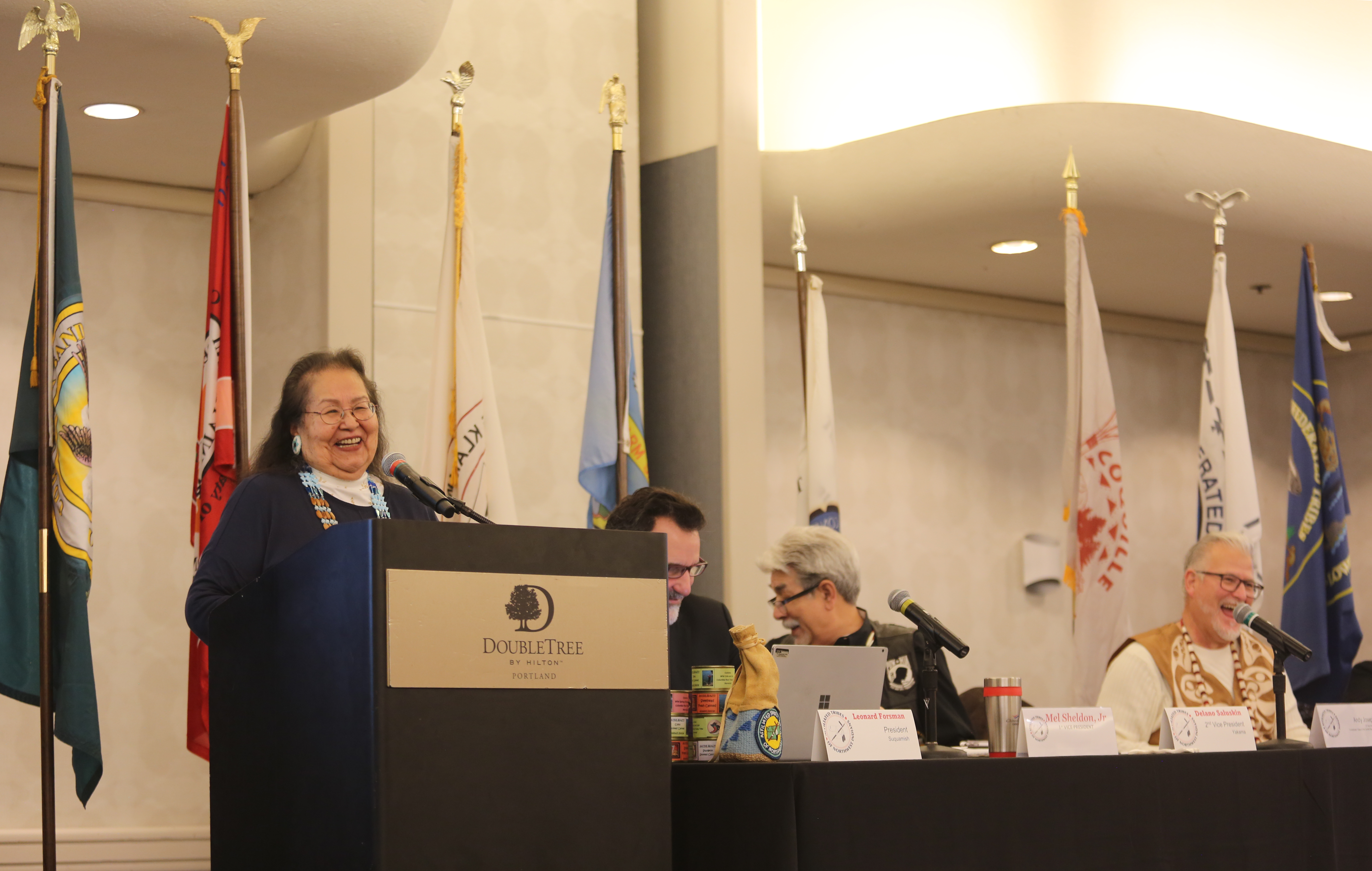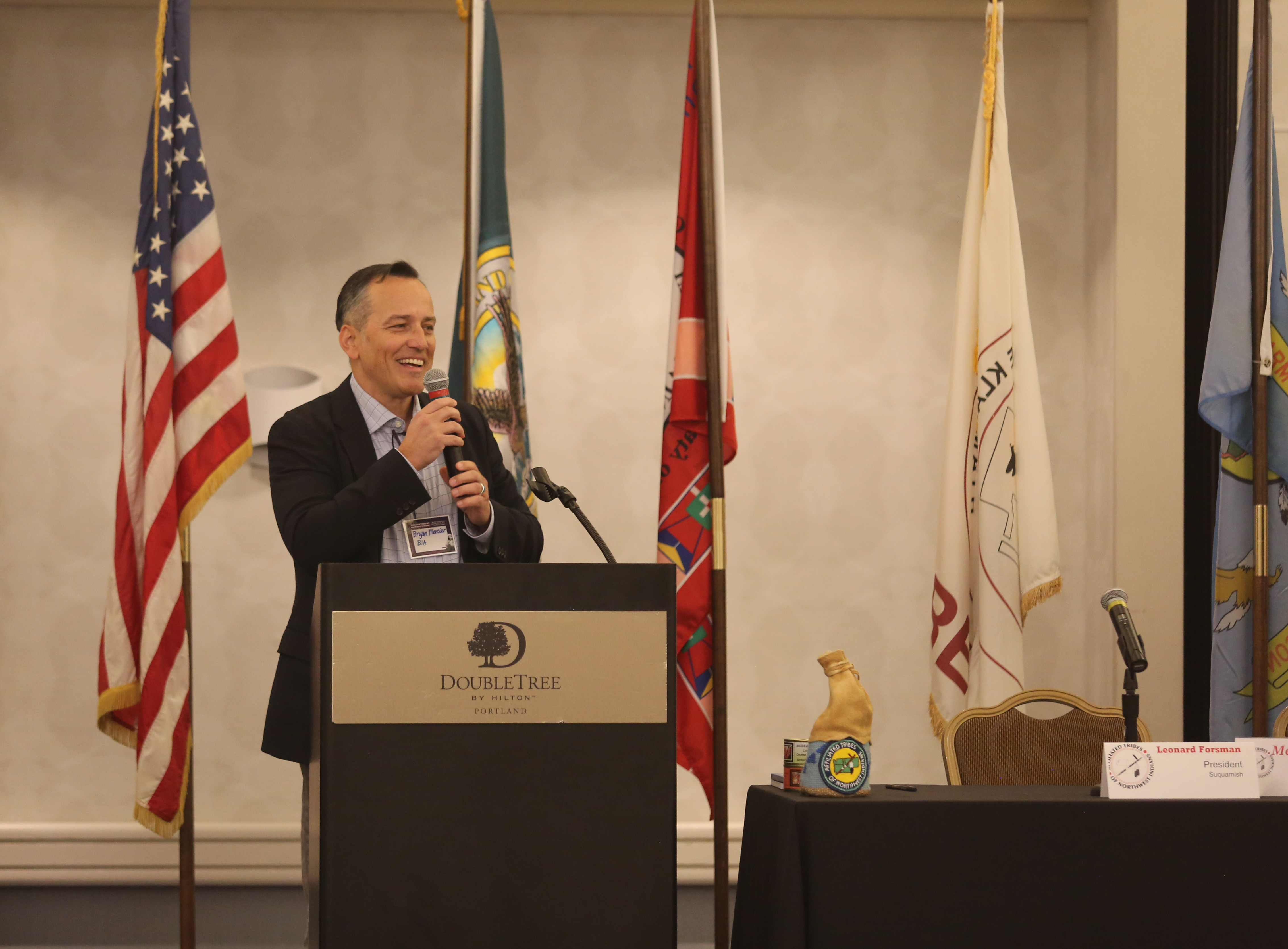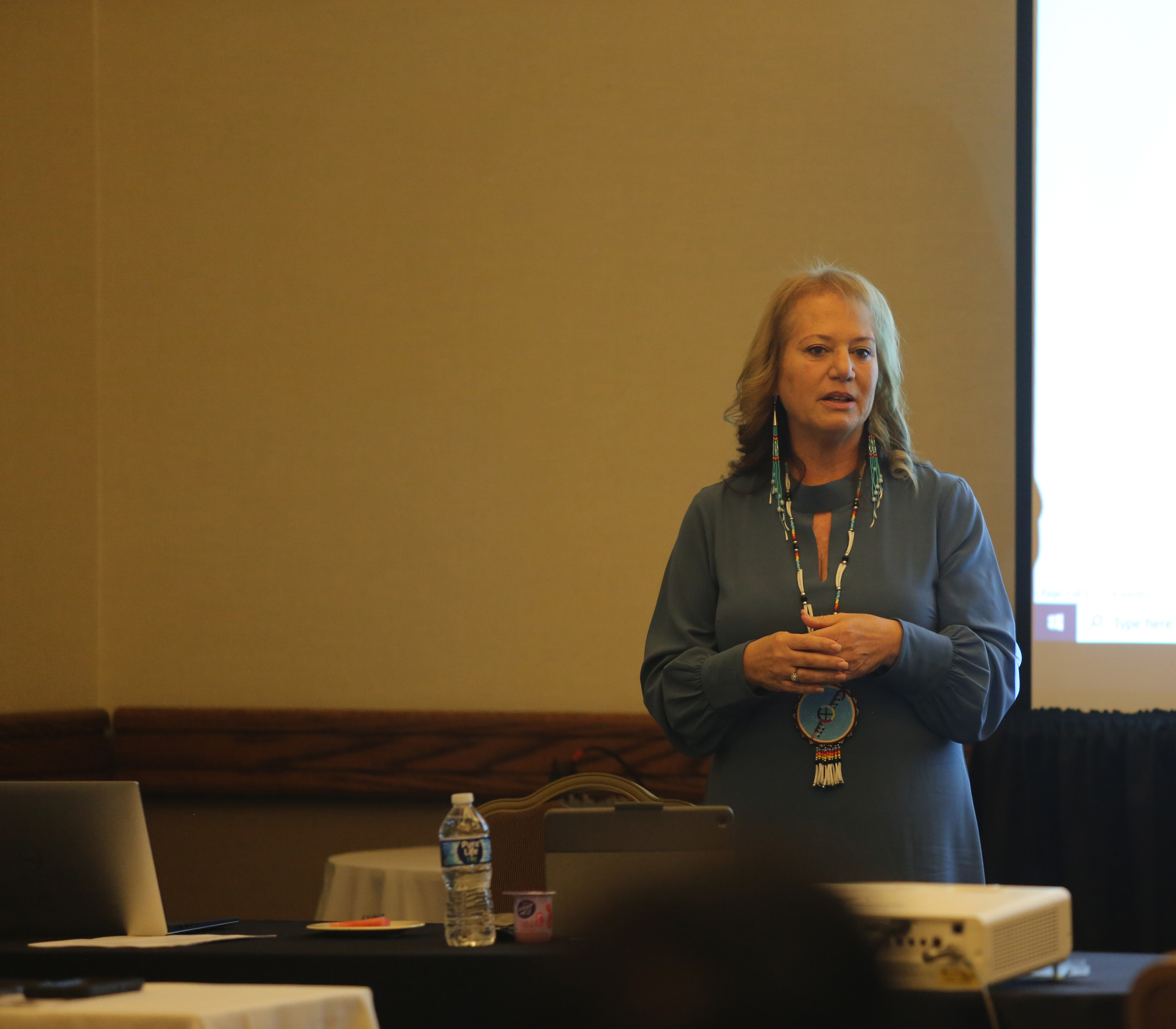Tribal Government & News
ATNI Winter Convention held in Portland

By Danielle Harrison
Smoke Signals assistant editor/staff writer
PORTLAND – The Affiliated Tribes of Northwest Indians’ Winter Convention returned to an in-person format for the first time since 2020 and continued to be well-attended with the Grand Ronde Tribe prominently represented.
The annual event, held Sunday, Jan. 22, through Thursday, Jan. 26, at the DoubleTree Hilton is an opportunity for meetings, discussion, presentations and committee work that affects policy, legislation and the future of Indian Country in the Pacific Northwest.
ATNI represents 57 Tribal governments from Oregon, Washington, Idaho, northern California, southeast Alaska and western Montana. The Winter Convention is sponsored by Oregon’s nine federally recognized Tribes.
Grand Ronde Tribal Council member Jon A. George serves as the second vice president of the organization and led Monday’s invocation.
Flags were brought in by the Northwest Indian Veterans Association, which included the Grand Ronde Veterans Honor Guard. Veterans Service Officer and Tribal member Ramona Quenelle carried in the Grand Ronde Tribal flag.
Grand Ronde Tribal Council Chairwoman Cheryle A. Kennedy welcomed the more than 200 attendees to the Tribe’s homelands and thanked the color guard and drummers.
“It's a pleasure to be here,” Kennedy said. “I want to thank all of our Tribal leadership that are here, all of the Northwest Tribes. I love the songs that were sung this morning. Thank you to the drummers and the singers that open this up in a good way, touch our hearts and give us strength. That's what this is all about. We're not here just on our own, but we receive strength, guidance, wisdom and help from our Creator for our veterans. Our Color Guard, thank you for the service that you've given. You are courageous, brave and strong. I lift my hands to you today.”
Kennedy said that she was pleased to see how many Tribal leaders were attending the convention.
“We appreciate you for caring for your people, for looking forward to the future and trying to bring that future to us today. That's who we are. We're the changers of our future and we will make it happen. We've got to make it happen so that our Tribal people remain strong, and this land, that was given to us by our Creator. … We need to do that. We need to celebrate our people. So I know that there's going to be serious issues that are dealt with today here and it's up to all of us to assimilate that information to carry it back home, and make the stands that we need. Our sovereignty is strong and yet it's under attack … But we're here to say no, that's not going to happen.”
Most Grand Ronde Tribal Council members attended the ATNI convention, including Kennedy, Jon A. George, Denise Harvey, Brenda Tuomi, Secretary Michael Langley and Michael Cherry.
Legislative Commission for Indian Services Executive Director Patrick Flanagan read a statement from Oregon’s nine Tribes. The commission was established 48 years ago by the Oregon Legislature as a means of creating a government-to-government relationship between the state and its nine federally recognized Tribes.
“It's was the first step in a long, ongoing journey toward recognizing Tribal sovereignty and formalizing state-Tribal relations,” he said. “It was formalizing, but not normalizing. Formalizing is easy: Place pen to paper, provide guidelines and expectations, and have a vote there. It's formalized. The normalizing takes time and effort. … Tribal people were here long before Oregon (was a state). We're still here today as we can see in this room, and we'll remain here in the future.”
Flanagan talked about increasingly common land acknowledgements being issued by governments and organizations.
“These have become so commonplace that we, the commission, was asked to provide guidance to state agencies about what a land acknowledgment should say, who it should recognize and when it should be offered,” he said. “So we accepted the challenge. And as a nonTribal member myself, it was an arduous, but enlightening and fulfilling process. I had genuine heartfelt and candid conversations with Tribal chairs about the benefits of land acknowledgements, as well as the harms. But ultimately we did put it on paper. We went through more than a few drafts. We came up with a guidance document that could be agreed upon by all Tribal representatives in the Commission on Indian Services.”
Flanagan said that was no small feat.
“The interconnectedness of all the people, the land and the natural environment cannot be overstated,” he said. “The health of one is necessary for the health of all. We recognize the sovereignty of the federally recognized Tribes who have ties to this region.”
Grand Ronde Tribal member and Bureau of Indian Affairs Regional Director Bryan Mercier gave a report, noting that the office is in the process of relocating from Portland to Vancouver.
“It will be a really nice office space for us and we're going to turn it into our own culturally appropriate space,” he said. “It’s hard for some of the Washington-based Tribes to get access to downtown Portland so please join us in this future spot at Fort Vancouver.”


Grand Ronde Tribal member and Bureau of Indian Affairs Pacific Northwest Regional Director Bryan Mercier laughs during his presentation at the Affiliated Tribes of Northwest Indians’ 2023 Winter Conference held on Monday, Jan. 23, in Portland. (Photo by Kamiah Koch/Smoke Signals)
Mercier said that his office conducts monthly conference calls on the last Thursday of every month with Northwest Tribes to keep them updated about BIA programs and other initiatives.
“The president’s budget for 2024 will be coming out next month so please join us to discuss that,” he said.
Mercier also noted that the office has an ongoing staff shortage and is working to address it.
“We do have a lot of salary to give us carryover,” he said. “But please bear with us as we train our new folks and become more efficient.”
Mercier also touched on a tentative Northwest Regional BIA Summit, proposed rulemaking for gaming and land acquisitions, and ongoing cleanup efforts of Columbia River treaty fishing sites.
“One of my priorities is the Columbia River,” he said. “We have 31 sites we serve and many are in poor condition. … We’ve got $2 million in hand that we’re going to use it to start improving those sites. So far, we’ve gone out and tagged many of the abandoned vehicles that are at the sites and started hauling those away to store them in a yard that we were able to get from the Army Corps of Engineers.”
Other Monday activities included boarding school legislation and language revitalization plans, a National Congress of American Indians report, an update on the Missing and Murdered Indigenous People task force and White House Tribal Nations Summit report.
The day concluded with a reception for Tribes at the Oregon Museum of Science and Industry.
On Tuesday, Jan. 24, there were updates on offshore wind energy development, Office of Clean Energy demonstrations, electrical grid resiliency, public safety and justice, and a dam removal video.
On Wednesday, Jan. 25, Grand Ronde Tribal Council member Denise Harvey gave a gaming update during morning committee meetings. She serves on the Indian Gaming Association board as the Pacific Northwest delegate.


Tribal Council member Denise Harvey speaks during a presentation on gaming in a breakout room at the Affiliated Tribes of Northwest Indians’ 2023 Winter Conference on Wednesday, Jan. 25, in Portland. Harvey has been an Indian Gaming Association board member since 2018. (Photo by Kamiah Koch/Smoke Signals)
Her presentation highlighted Oregon gaming issues. She discussed the Oregon Racing Commission hearings on whether to allow TMB Racing, a company formed by Dutch Bros founder Travis Boersma, to operate 225 slot machine-like historic racing machines at the Flying Lark in Grants Pass. The Oregon Department of Justice ultimately said that the Racing Commission approving the request would be unconstitutional as it would violate a state prohibition against private casinos.
“We had the Flying Lark issue, similar to the Maverick issue that Washington is dealing with now,” Harvey said. “In Oregon that was moving full steam ahead and we were kind of keeping an eye on the Oregon Racing Commission agenda and we happened to see they were going to be licensing them. We pushed and pushed and pushed for the state to put the brakes on it and luckily we were able to do that. They tabled it and the state Department of Justice came back and sided with the Tribes on that issue.”
Harvey also addressed the smoking ban that went into effect at Spirit Mountain Casino in March 2022.
“The smoking ban has affected all of us and our businesses,” Harvey said. “Whether it’s taking revenue or not, or is a discomfort for some of our customers, we don’t really know for sure. Spirit Mountain decided to create an expansion where it’s just a smoking room. It’s got all types of ventilation and fresh air and all this other stuff that’s supposed to keep the smell of smoke and carcinogens out of the air. So, we’re getting ready to open that in a couple of months. We were hearing from a lot from our customers about people having to go out in the cold. Hopefully (the new room) that’s a good thing.”
Harvey touched on Spirit Mountain Community Fund and how many people don’t realize that it is connected to the casino.
“Many of the people in the polling that we did did not recognize that our foundation is connected to our gaming organization, where that money comes from and how we give to nonprofits in the state,” she said. “So we buffed that marketing up. … Not that we want to brag about how much money we give away, but we are a huge support to our community.
“People just aren’t aware of it and that’s something we really worked on. I do believe through COVID we were able to get a lot of community support because the Tribe really stepped in and made vaccines available and other things to the public.”
Harvey discussed the Hatfield Fellowship and said she wished more Tribes would do something similar.
“We take money from our foundation and send a Fellow back to D.C. to work in one of the regional delegation offices for one year,” she said. “It’s a very high-level internship and we’ve had huge success stories come from that. … It’s really helped with bringing Indian people back to the table and carry our messages forward.”
Other topics Wednesday included an ATNI executive director report, climate change program report, a water/energy report and the National Tribal Fentanyl Summit.
Northwest Portland Area Indian Health Board Chairman Nickolaus Lewis (Lummi) said that the ongoing opioid epidemic is affecting Tribal people at a very high rate, and that some morgues in King and Whatcom counties are running out of space for bodies.
“It is reported that the death rate due to overdoses is 30 percent higher than white people,” he said. “And with that data is the highest death rate of overdose of all racial backgrounds.”
He told attendees about the National Tribal Opioids Summit set for Aug. 22-24 in Tulalip, Wash., and the Washington Opioids Summit tentatively set for the end of May.
“So, we are here today to ask you to join us as attendees,” Lewis said. “But also as partners in our efforts of addressing the impacts of fentanyl in our communities. We cannot do this alone. We cannot address these issues in silos. And it's not OK to stay idle and watch this epidemic continue to rob us of our current generation.”
The convention wrapped up on Thursday, Jan. 26, with resolutions that will be forwarded to the National Congress of American Indians for consideration.
Smoke Signals social media/digital journalist Kamiah Koch contributed to this report.
